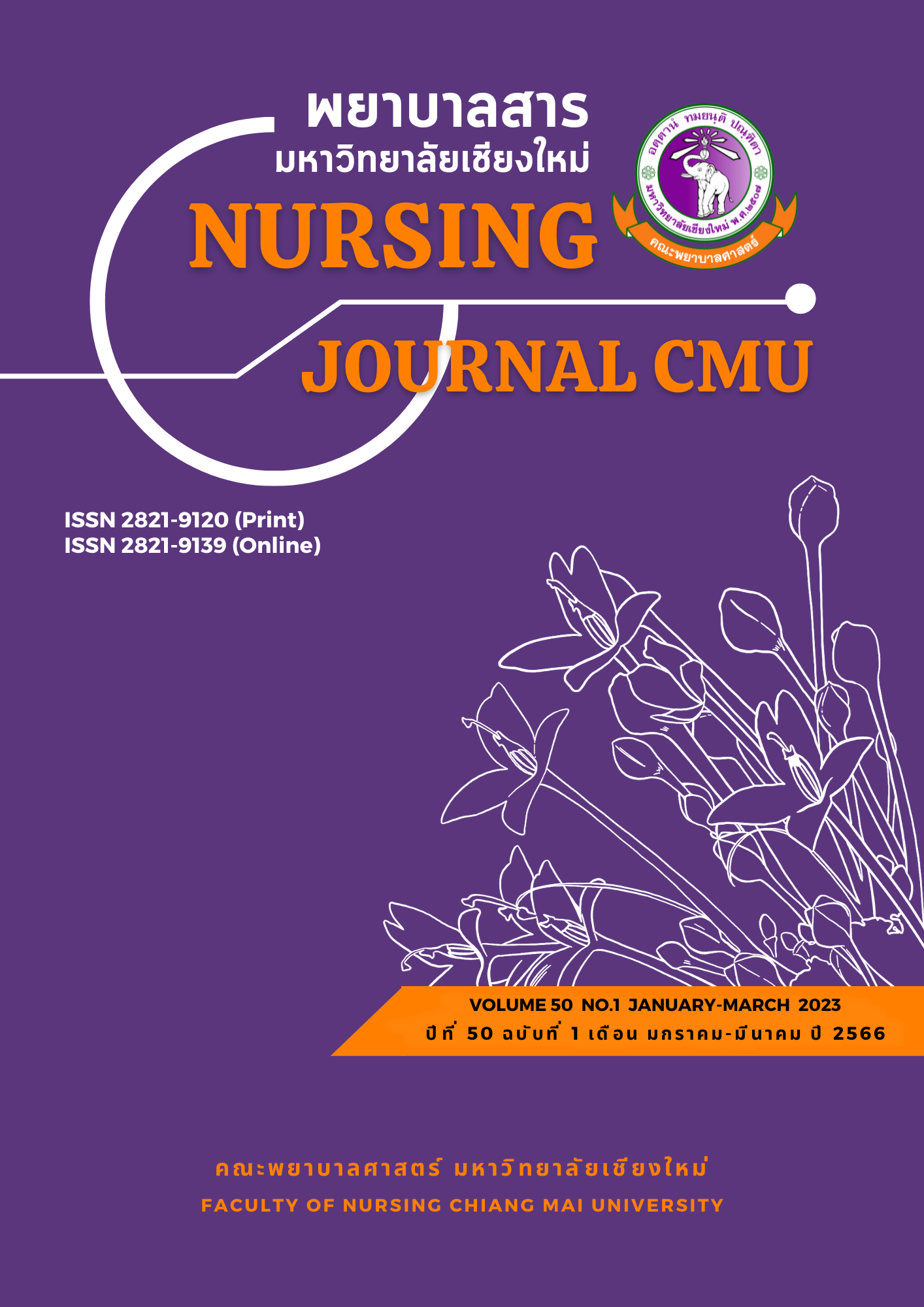The Effects of a Board Game Exercise Program on Cognitive Function in Older People
Keywords:
Older people, Cognition, A board game exercise programAbstract
The purpose of this quasi-experimental research was to study the effect of a board game exercise program on cognitive function. The participants consisted of 48 older people who resided in Yang Talat District, Kalasin Province. Simple random sampling was used, and participants were divided into 2 groups, an experimental group and a control group, with 24 participants in each. The experimental group participated in the program for a duration of 6 weeks. The research tools consisted of a general information questionnaire; Barthel Activities of Daily Living; the Thai Geriatric Depression Scale; the Mini-Mental State Examination-Thai Version 2002; the Montreal Cognitive Assessment (MoCA); and the tool used in the experiment which was a brain exercise program with a board game. Data were analyzed using descriptive statistics to calculate mean and percentage, and mean cognitive scores were compared using a paired t-test. The experimental group who participated in the program had a statistically significantly higher mean cognitive score than those of the control group (p < 0.05) and higher than before participating in the program (p < 0.05).
The results show that the board game exercise program could improve cognitive scores in older people. Therefore, this program could be useful to health personnel for enhancing cognitive function in the elderly in communities, sub-district senior citizens’ clubs, senior schools, and cooperatives with network partners in communities to have better cognitive function.
References
Alzheimer’s Disease International. (2019). Alzheimer’s disease. Retrieved from https://www.alzint.org/
Chaiwong, P. (2015). Effects of cognitive comprehension training program on ability cognitive aspects and quality of life of elderly people with suspected dementia (Unpublished master’s thesis). Chiang Mai University, Thailand.
Delgado, M. L. (2005). Training program in strategies to improve memory. Revista de Neurologia, 33(4), 365-372. Retrieved form https://www.ncbi.nlm.nih.gov/
Department of Health, Ministry of Public Health. (2020). Elderly health promotion and dementia prevention handbook. Retrieved from https://hpc2service.anamai.moph.go.th/ltcdata/files/14.pdf
Foundation of Thai Gerontology Research and Development institute. (2016). Current situation in dementia syndrome in Thailand. Retrieved form https://thaitgri.org/
Kriengkaisakda, W., & Chadcham, S. (2012). Development of a brain-training rehabilitation program based on neurobics exercise theory for patients with mild dementia. Research Methodology & Cognitive Science, 10(1), 11-25. (in Thai)
Lara, A. H., Kennerley, S. W., & Wallis, J. D. (2009). Encoding of gustatory working memory by orbitofrontal neurons. Journal of Neuroscience, 29(3), 756-774.
doi: 10.1523/JNEUROSCI.4637-08.2009
Lawrence, C. K. (2010). Neurobic exercise to help prevent memory loss and increase mental fitness. Carolina: Mental Center Durham, North Carolina University.
National Statistical Office. (2019). Trends of the elderly population in Thailand. Retrieved from http://www.nso.go.th/sites/2014 (in Thai)
Robin, L. W., & Thomas, H. C. (2006). Video training of imagery for mature adults. Applied Cognitive Psychology, 6(4), 307-320.
Suwanmosi, P. (2014). The effect of using a cognitive stimulation program on the memory of the elderly in community with cognitive impairment (Master’s thesis). Chulalongkorn University, Thailand. (in Thai)
Thavichachart, N. (2008). Exercise before dementia. Journal of the Psychiatric Association of Thailand, 32(1), 1-15. (in Thai)
Trakulsithichoke, S., & Suwan, A. (2016). Effects of a cognitive stimulation program on cognitive abilities and the ability to perform activities of daily living in the elderly at risk
or have dementia. Journal of Thai Red Cross Nursing, 9(2), 145-158. (in Thai)
Tunta, K., Saengpanya, B., Phakhawatwattana, P., Chanwitakorn, P., Amarinpornchai, P., Kerdchantrong, P., … Ao-Charoen, P. (2015). Nursing student innovation: Brain training box. Thai Red Cross Nursing Journal, 8(1), 113-121. (in Thai)
United Nations. (2019). World population ageing. Retrieved from https://www.un.org/development/desa/pd/sites
Downloads
Published
How to Cite
Issue
Section
License
Copyright (c) 2023 Nursing Journal

This work is licensed under a Creative Commons Attribution-NonCommercial-NoDerivatives 4.0 International License.
บทความที่ได้รับการตีพิมพ์เป็นลิขสิทธิ์ของวารสารพยาบาลสาร
ข้อความที่ปรากฏในบทความแต่ละเรื่องในวารสารวิชาการเล่มนี้เป็นความคิดเห็นส่วนตัวของผู้เขียนแต่ละท่านไม่เกี่ยวข้องกับมหาวิทยาลัยเชียงใหม่ และคณาจารย์ท่านอื่นๆในมหาวิทยาลัยฯ แต่อย่างใด ความรับผิดชอบองค์ประกอบทั้งหมดของบทความแต่ละเรื่องเป็นของผู้เขียนแต่ละท่าน หากมีความผิดพลาดใด ๆ ผู้เขียนแต่ละท่านจะรับผิดชอบบทความของตนเองแต่ผู้เดียว






